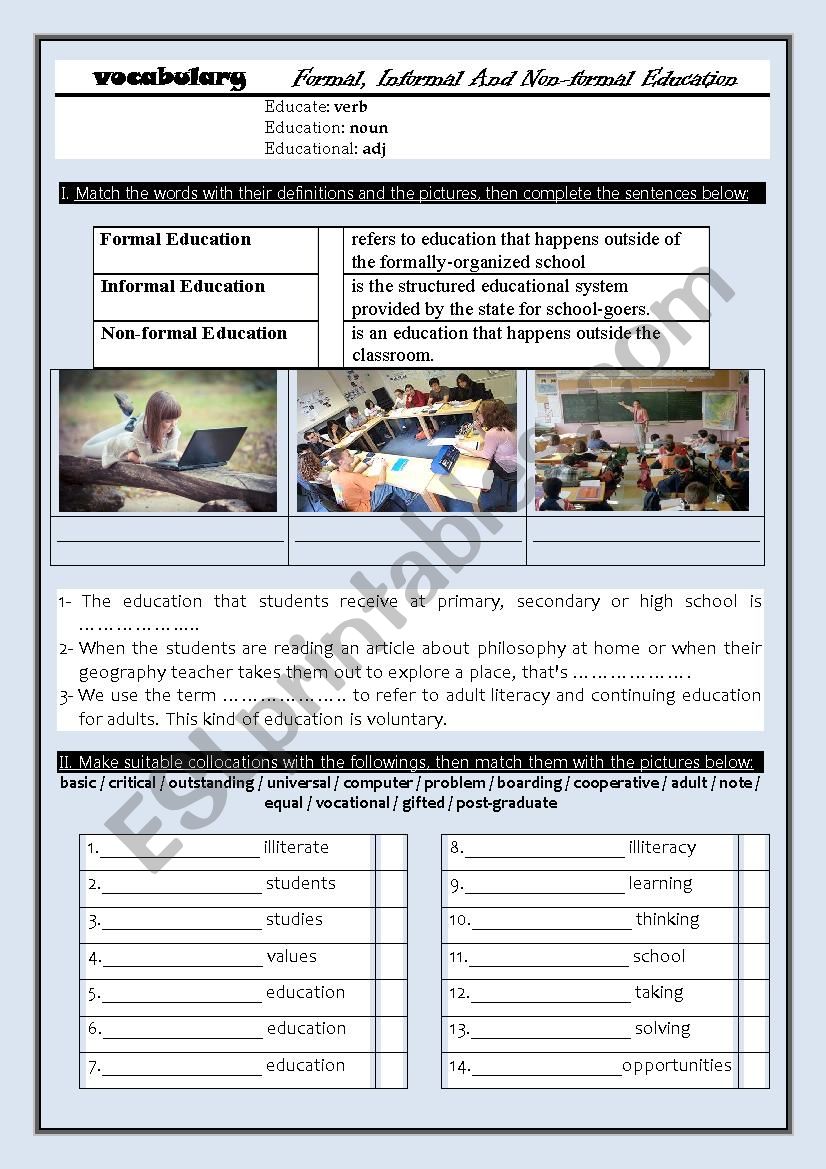

Informal education would also include all incidental learning that takes place while at work or at play and during travels as well as spontaneous learning through films, radio and television. This would include the deliberate attempts of parents and elders in the family and community to help the young ones grow and adapt themselves to the environment. Informal education is “the process, by which a person imbibes attitudes, develops skills, cultivates values and acquires knowledge without there being any organisation or system about it. Non-formal education, as provided by youth organizations such as the World Association. NFE is “any organised, systematic, educational activity, carried outside the framework of the established formal system, whether operating separately or as an important feature of some broader activity that is intended to serve identifiable learning clientele and learning objective”. a large extent, not present in either formal or informal education. There is maximum participation of the learner. It is a process of sharing, exploring, analysing and judging together. Non-formal education develops an open-end critical and self reliant awareness.

In formal education acquisition of knowledge is the goal in non-formal education, the goals understand one’s needs environment and social relationships. The main difference between informal and non-formal education is the fact that the first is non-voluntary and mostly passive whereas the latter results from an individual voluntary action and is mostly active. 2 Vocational training and informal learning in the UK: character- istics and concepts. The NFE is lifelong and with flexible points of entry, while formal education is finite and limited to a period meant for teaching and learning, with fixed point of entry and exit. and non-formal education-educational activity which is not structured and takes place outside the formal system. How informal and non-formal learning is recognised in the UK. Non-formal education is learning acquired independently through non-academic means.

Generally speaking, a persons formal education begins at nursery or kindergarten and may stretch on through University. It will be a working seminar targeted towards practitioners and policy-makers who are directly involved in validating non-formal and informal learning.Non-Formal Education may be differentiated from the conceptual framework of formal education and informal education. Formal education is the structured system of learning provided or overseen by a local or national government body for its citizens. The seminar on 9-10 April 2013 will provide the first opportunity for validation stakeholders from all relevant areas, to discuss and take a first concrete step towards putting elements of the Recommendation into action. Small children often attend a nursery or kindergarten but often formal education begins in elementary. FORMAL EDUCATION Formal education or formal learning usually takes place in the premises of school, where a person may learn basic, academic, or trade skills. While arrangements for validation have been put in place in some countries and sectors, the knowledge, skills and competences acquired outside schools, universities and VET establishments remain in many cases invisible and not appropriately valued. Each of these types is briefly described below. It also reflects that existing arrangements for validation of non-formal and informal learning are considered to be too limited in coverage and impact. Education (formal, non-formal, informal) The European guidelines identify the educational process in any activity undertaken by people, in the various stages of life, in order to improve their knowledge, skills and competences, from a personal, civic, social and occupational point of view, in a formal, non-formal or informal way. In this context, non-formal and informal learning (NFIL) practices, as well as the possibility of NFIL recognition and validation, can benefit a wide range. The adoption of the Council Recommendation on the validation of non-formal and informal learning of 20 December 2012 acknowledges the important role this process can plan in rethinking education, in improving the supply of skills to the labour market, in promoting mobility and in enhancing competitiveness and economic growth.


 0 kommentar(er)
0 kommentar(er)
